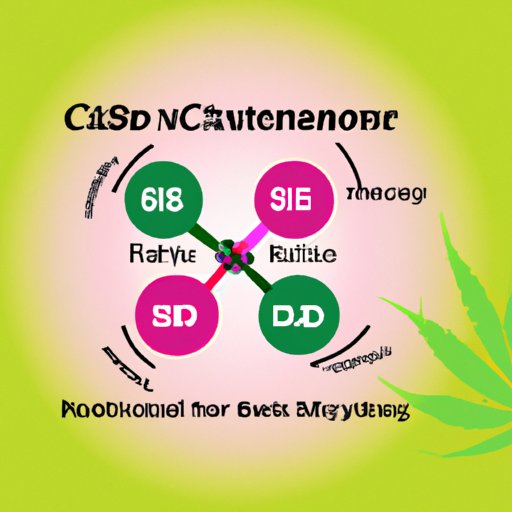Introduction
Have you heard of CBD? It has taken the wellness industry by storm, and for good reason. CBD, or cannabidiol, is a component of cannabis sativa plants, but unlike THC (tetrahydrocannabinol), it doesn’t result in the characteristic “high” feeling. Instead, CBD is said to provide relief from pain, inflammation, anxiety, and insomnia, among other health issues.
As CBD gains popularity, many women have started to wonder whether it affects female fertility. Unfortunately, there’s still a lot of confusion and misinformation circulating about this topic. This article aims to provide an evidence-based overview of what we know about CBD use and female fertility.
CBD and Female Fertility: An Overview of the Latest Research Findings
To understand how CBD might affect female fertility, it’s essential to understand how it interacts with our bodies. The human body has an endocannabinoid system (ECS) that regulates various physiological processes, including mood, appetite, and reproduction. CBD interacts with this system, influencing how the body produces hormones and responds to stress.
While research on CBD’s effects on female fertility is still limited, there have been some recent studies on the topic. In a 2019 review, researchers looked at how cannabis use affects female reproductive function. They found evidence that cannabis use could delay ovulation and disrupt the menstrual cycle, but the available studies didn’t isolate the effects of CBD.
Another study published in 2020 examined the effects of CBD on mouse eggs in vitro. The researchers found that CBD reduced the number of eggs that matured and ovulated, potentially impacting fertility. However, it’s important to note that this study was done on mice, not humans, and the doses used were much higher than a typical human would consume.
Can CBD Use Affect Women’s Ability to Conceive? A Comprehensive Review
One of the most common concerns women have about CBD use and fertility is whether it can impact their ability to conceive. There’s currently no clear answer to this question, as research results have been mixed. Some studies suggest that CBD could reduce female fertility, while others find no significant effects.
A 2011 study looked at the effects of cannabinoids on the menstrual cycle using a survey of 2000 women. The researchers found that 34% of cannabis users experienced changes in their menstrual cycle, including increased cycle length and irregular periods. However, it’s unclear whether these changes were due to CBD or other components of cannabis.
Another study published in 2021 looked at the impact of CBD use on IVF outcomes. The researchers found that women who used CBD before undergoing IVF had a higher rate of successful embryo implantation. However, this study had a small sample size and didn’t adjust for other factors that could impact IVF outcomes.
The Connection Between CBD and Female Reproductive Health: What You Need to Know
To understand how CBD affects female fertility, it’s helpful to look at its impact on reproductive health more broadly. The endocannabinoid system plays a crucial role in regulating reproductive processes, including ovulation, fertilization, and implantation. CBD interacts with this system, influencing hormone levels and other reproductive functions.
There’s evidence to suggest that CBD can regulate estrogen production and decrease inflammation in the reproductive system, potentially improving fertility. However, as we’ve seen, there’s also evidence that CBD can disrupt ovulation and menstrual cycles, potentially reducing fertility. It’s difficult to draw definitive conclusions about CBD’s impact on female fertility due to the limited research available.
CBD and Female Fertility: Sorting Out Fact from Fiction
With so much conflicting information about CBD use and female fertility, it’s essential to separate fact from fiction. One common myth is that CBD can cause infertility. While some studies suggest that CBD could reduce female fertility, there’s no clear evidence that it causes infertility.
Another myth is that CBD can prevent or cure infertility. While CBD may have some potential benefits for reproductive health, there’s no scientific evidence to support using it as a fertility treatment.
Should Women Trying to Conceive Avoid CBD? Experts Weigh In
If you’re trying to conceive or struggling with infertility, you may wonder whether it’s safe to use CBD. While there’s no clear consensus among medical professionals, some experts suggest that women avoid CBD while trying to conceive or undergoing fertility treatments. This is because we don’t yet fully understand how CBD affects female reproductive health, and there’s a risk that it could impact fertility or interfere with other treatments.
CBD and Infertility in Women: Debunking Common Myths and Misconceptions
One of the most significant challenges facing women seeking accurate information about CBD and fertility is the widespread misinformation and stigma surrounding cannabis use. Some individuals and organizations spread falsehoods about the effects of CBD, promoting fears that it can cause infertility, birth defects, or other serious health issues. Unfortunately, these myths can lead to unnecessary fear and stigma and prevent women from making informed decisions about their health.
Conclusion
In conclusion, there’s still much we don’t know about CBD use and female fertility. While some studies suggest that CBD could affect reproductive health, others find no significant impact. Given the limited research available, it’s crucial for women to approach CBD use with caution and seek guidance from medical professionals when making decisions about their health. CBD may have some potential benefits for reproductive health, but until we have a better understanding of its effects, it’s essential to proceed with caution.
